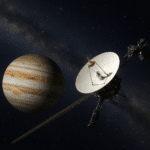Space law is a fascinating and complex field that addresses the ownership and governance of outer space. As humanity continues to explore and utilize space for various purposes, the legal frameworks that govern these activities become increasingly important. This article delves into the intricacies of space law, exploring who owns space and how it is governed.
The Origins and Development of Space Law
The concept of space law emerged in the mid-20th century, coinciding with the dawn of the space age. The launch of Sputnik 1 by the Soviet Union in 1957 marked the beginning of human activities in outer space, prompting the need for legal frameworks to regulate these activities. The United Nations (UN) quickly recognized the importance of establishing international guidelines to ensure the peaceful use of outer space.
In 1959, the UN established the Committee on the Peaceful Uses of Outer Space (COPUOS) to address issues related to space exploration and utilization. This committee played a pivotal role in the development of key treaties and principles that form the foundation of space law today. The most significant of these is the Outer Space Treaty of 1967, which serves as the cornerstone of international space law.
The Outer Space Treaty, formally known as the Treaty on Principles Governing the Activities of States in the Exploration and Use of Outer Space, including the Moon and Other Celestial Bodies, outlines several fundamental principles. It establishes that outer space, including the Moon and other celestial bodies, is the province of all humankind and is not subject to national appropriation. This means that no country can claim sovereignty over any part of outer space.
Additionally, the treaty emphasizes the importance of using outer space for peaceful purposes and prohibits the placement of nuclear weapons or other weapons of mass destruction in space. It also holds states responsible for their activities in space, including those conducted by private entities, and mandates that they avoid harmful contamination of celestial bodies.
Key Treaties and Agreements in Space Law
Beyond the Outer Space Treaty, several other treaties and agreements have been established to address specific aspects of space law. These include the Rescue Agreement, the Liability Convention, the Registration Convention, and the Moon Agreement.
The Rescue Agreement
The Agreement on the Rescue of Astronauts, the Return of Astronauts, and the Return of Objects Launched into Outer Space, commonly known as the Rescue Agreement, was adopted in 1968. It builds upon the principles of the Outer Space Treaty by outlining the responsibilities of states in assisting astronauts in distress and returning them safely to their home countries. The agreement also addresses the return of space objects that land on foreign territory.
The Liability Convention
The Convention on International Liability for Damage Caused by Space Objects, or the Liability Convention, was adopted in 1972. This treaty establishes a framework for determining liability for damage caused by space objects. It holds launching states liable for any damage caused by their space objects on the surface of the Earth or to aircraft in flight. In the case of damage occurring in outer space, liability is determined based on fault.
The Registration Convention
The Convention on Registration of Objects Launched into Outer Space, known as the Registration Convention, was adopted in 1976. It requires states to register space objects launched into Earth orbit or beyond with the UN. This registration process helps maintain transparency and accountability in space activities, allowing for the identification and tracking of space objects.
The Moon Agreement
The Agreement Governing the Activities of States on the Moon and Other Celestial Bodies, commonly referred to as the Moon Agreement, was adopted in 1984. This treaty expands upon the principles of the Outer Space Treaty by specifically addressing the use of the Moon and other celestial bodies. It emphasizes that these celestial bodies are the common heritage of humankind and should be used for the benefit of all countries.
However, the Moon Agreement has not been widely adopted, with only a few countries ratifying it. This limited acceptance has led to ongoing debates about its relevance and effectiveness in governing lunar activities.
Challenges and Future Directions in Space Law
As space exploration and utilization continue to evolve, new challenges and opportunities arise in the realm of space law. One of the most pressing issues is the increasing involvement of private companies in space activities. The rise of commercial space ventures, such as satellite launches, space tourism, and asteroid mining, raises questions about the applicability of existing legal frameworks and the need for new regulations.
Another significant challenge is the issue of space debris. The growing amount of debris in Earth’s orbit poses a threat to both manned and unmanned space missions. Addressing this issue requires international cooperation and the development of effective mitigation and remediation strategies.
Furthermore, the potential for resource extraction from celestial bodies, such as asteroids and the Moon, presents both opportunities and legal complexities. While the Outer Space Treaty prohibits national appropriation, it does not explicitly address the extraction and ownership of space resources. This ambiguity has led to discussions about the need for new legal frameworks to govern space mining activities.
In response to these challenges, the international community continues to engage in discussions and negotiations to adapt space law to the changing landscape of space activities. The development of new treaties, agreements, and guidelines will be crucial in ensuring the sustainable and equitable use of outer space for future generations.
Conclusion
Space law is a dynamic and evolving field that plays a critical role in shaping the future of space exploration and utilization. As humanity continues to push the boundaries of what is possible in outer space, the legal frameworks that govern these activities must adapt to address new challenges and opportunities. By fostering international cooperation and dialogue, we can ensure that outer space remains a domain of peace, cooperation, and shared benefit for all humankind.










